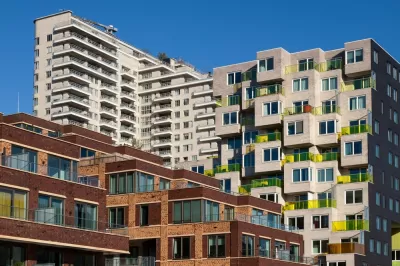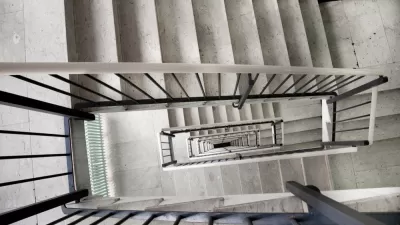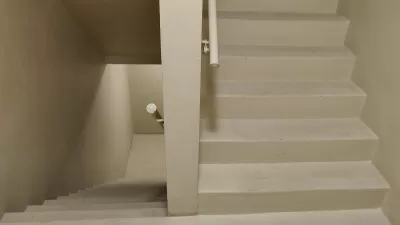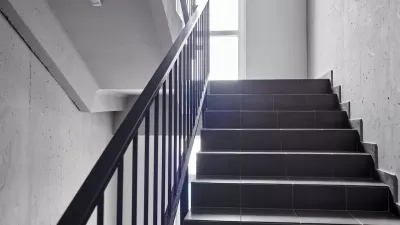One writer argues that single-staircase buildings solve an architectural problem and make buildings more interesting, but the political problem of the U.S. housing crisis goes much deeper.

The single-staircase building, prohibited in many U.S. cities due to fire safety regulations, has been getting a lot of attention lately as U.S. housing advocates look to loosening staircase regulations as one way to create more housing and lower construction costs. Planetizen has previously covered arguments in favor of single-staircase construction, whose proponents say it would improve housing affordability and encourage more ‘missing middle housing.’
Writing in The Nation, Kate Wagner argues that permitting single-staircase buildings is not the housing solution many think it is. Although a “good idea,” for Wagner, it is simply a design change that “fixes an architectural problem. There is little evidence as far as I can see that the schema will do anything to lower rents or fix urban inequality or anything else that would be so deeply transformative.”
Ultimately, for Wagner, the problem at the root of the housing crisis and of tragedies like the 2017 Grenfell Tower fire is “a housing market that is completely financialized and inherently predatory.” The drive to profit from housing as a commodity, Wagner argues, can’t be solved through design changes.
I would posit that rarely are buildings architectural failures—more often, they are social and political failures.
Wagner goes on, “Single-stair is not going to fix the housing crisis, because the housing crisis stems from an economic system in which housing is a commodity and a money-making scheme instead of a human right to shelter.” The key: “severing the connection between shelter and profit.”
FULL STORY: Single-Stair Layouts Are Not Going to Fix the Housing Crisis

Maui's Vacation Rental Debate Turns Ugly
Verbal attacks, misinformation campaigns and fistfights plague a high-stakes debate to convert thousands of vacation rentals into long-term housing.

Planetizen Federal Action Tracker
A weekly monitor of how Trump’s orders and actions are impacting planners and planning in America.

In Urban Planning, AI Prompting Could be the New Design Thinking
Creativity has long been key to great urban design. What if we see AI as our new creative partner?

King County Supportive Housing Program Offers Hope for Unhoused Residents
The county is taking a ‘Housing First’ approach that prioritizes getting people into housing, then offering wraparound supportive services.

Researchers Use AI to Get Clearer Picture of US Housing
Analysts are using artificial intelligence to supercharge their research by allowing them to comb through data faster. Though these AI tools can be error prone, they save time and housing researchers are optimistic about the future.

Making Shared Micromobility More Inclusive
Cities and shared mobility system operators can do more to include people with disabilities in planning and operations, per a new report.
Urban Design for Planners 1: Software Tools
This six-course series explores essential urban design concepts using open source software and equips planners with the tools they need to participate fully in the urban design process.
Planning for Universal Design
Learn the tools for implementing Universal Design in planning regulations.
planning NEXT
Appalachian Highlands Housing Partners
Mpact (founded as Rail~Volution)
City of Camden Redevelopment Agency
City of Astoria
City of Portland
City of Laramie





























